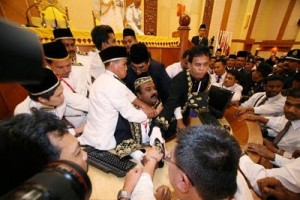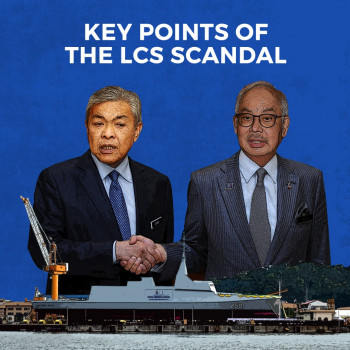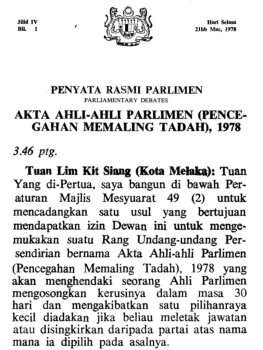by T.K. Tan
 2009 was the year of infamy for Malaysia as Malaysians witnessed the legitimately elected Perak Pakatan Rakyat state government toppled in the most brusque manner. A flashback of the year’s events reminds us why the fight for justice and democracy in this lopsided playing field is a call all Malaysians must heed to protect the freedom we cherish.
2009 was the year of infamy for Malaysia as Malaysians witnessed the legitimately elected Perak Pakatan Rakyat state government toppled in the most brusque manner. A flashback of the year’s events reminds us why the fight for justice and democracy in this lopsided playing field is a call all Malaysians must heed to protect the freedom we cherish.
BN’s illegal coup of the Perak state government in February 2009 was a watershed event in Malaysian political history.
Even by BN’s standard of past underhanded tactics, the 2009 power grab took it to putrefying lows in the annals of dubious takeover of opposition-held state governments by BN. The public’s confidence and trust in the legal institutions and separation of powers was damaged, perhaps irreparably.
When the saga of defections of the three ADUNs unfolded, PR took the morally right and logical step of seeking the dissolution of the state assembly (DUN) and holding fresh elections. What transpired took many by surprise.
Not only was Datuk Seri Nizar Jamaluddin’s request for the state assembly’s dissolution denied, he was sacked by the palace. In his place BN’s Datuk Zambry Kadir was appointed MB.
Though it was not the first time that rulers in Perak and other states have decided the appointment of the Menteri Besar (MB), Nizar’s dismissal as MB raised many questions.
In the Perak state constitution it states, ‘If the MB ceases to command the confidence of the majority of the members of the Legislative Assembly, then, unless at his request His Royal Highness dissolves the Legislative Assembly, he shall tender the resignation of the Executive Council.’
In addition, His Royal Highness Sultan Azlan Shah had once written in an article ‘The Role of Constitutional Ruler’ that “under normal circumstances, it is taken for granted that the Yang di-Pertuan Agong would not withhold his consent to a request for dissolution of the parliament. His role under such a situation is purely formal.”
Legislative mockery
 As the crisis unfolded, PR sought to prove Zambry’s appointment was unconstitutional. State speaker V. Sivakumar call’s for an emergency sitting of the assembly to ratify support for Nizar was disavowed by the state secretary. The PR ADUNs were barred from entering the DUN by the state secretary, in clear defiance of the speaker’s authority.
As the crisis unfolded, PR sought to prove Zambry’s appointment was unconstitutional. State speaker V. Sivakumar call’s for an emergency sitting of the assembly to ratify support for Nizar was disavowed by the state secretary. The PR ADUNs were barred from entering the DUN by the state secretary, in clear defiance of the speaker’s authority.
The emergency assembly which was then conducted in the car park of an adjacent lot approved a motion of confidence for Nizar as MB. However, the state government continued to operate under the instruction of Zambry.
The legislative faceoff finally culminated in a showdown more akin to a hooligan brawl, dragging Malaysian democratic image to a new low. The speaker of the State Legislative Assembly was shouted at and forcibly carried away from his seat, and in his place a new speaker installed ignominiously.
During the ordeal, public dissent was clamped in a draconian manner. Some were charged for sedition for writing articles critical of the coup including DAP national chairman Karpal Singh, for merely stating a Ruler can be sued, a provision stated in the federal constitution.
Judiciary fiasco
Perhaps the greatest damage was to the judiciary for its handling of the legal proceedings. Nizar, who had challenged Zambry’s appointment as MB in court, was ruled as the legitimate MB on 11 May 2009 by the KL High Court.
Barely 18 hours later, the appeal court hastily granted Zambry a stay of execution on the decision by a single judge, unprecedented in Malaysian history.
On 22 May, the appeal court ruled that Zambry was the legitimate MB. On February the Federal Court followed suit in its decision. A past case, Stephen Kalong Ningkan vs the Malaysian Government, had clearly spelt that a Chief Minister or MB can only be removed by a vote of confidence in the legislative assembly.1
Even constitutional expert Shad Saleem Faruqi, who wrote a favourable opinion defending the Federal Court’s decision, conceded that ‘the procedure by which Nizar was removed raises issues of constitutional propriety. There was undue haste in dismissing the leader of a popularly elected coalition.’ 2
Further mockery of the judiciary ensued. The Ipoh High Court judge struck out a civil suit by V Sivakumar against BN speaker R Ganesan on his legality as speaker, citing that the court could not interfere with what had been decided by the Perak assemblymen at their sitting on May 7 in accordance with Article 72 (1) of the Federal Constitution.
However the same judge ruled that the decision of the same legislative assembly to remove the plaintiff as speaker and to appoint the defendant was conclusive and had been fairly determined by the state assembly on May 7, 2009.3
The power grab has eroded people’s trust towards the government. Malaysian’s aspiration for cleaner and just governance cannot take place if this government is still in place. Perak has reminded us of that. Will we take heed?
Source
1. The Dismissal and Appointment of Menteri Besars in Perak, Hardial Singh Khaira. Pg 5
2. Perak: A State of Crisis, LoyarBurok. Pg 160
3. A Clever, Conveniently Contradictory and Convoluted Judgment, Martin Jalleh.



